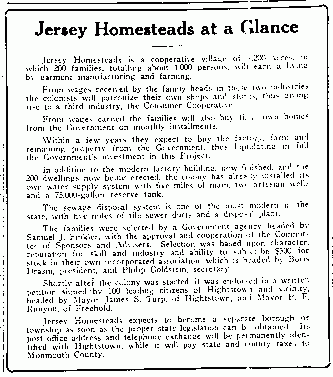Jersey Homesteads is a cooperative village of 1,200 acres, in which 200 families, totalling about 1,000 persons, will earn a living by garment manufacturing and farming.
From wages received by the family heads in these two industries the colonists will patronize their own shops and stores, thus giving rise to a third industry the Consumer Cooperative.
From wages earned the families will also buy their own homes from the Government on monthly installments.
Within a few years they expect to buy the factory, farm and remaining property from the Government, thus liquidating in full the Government's investment in this Project.
In addition to the modern factory building, now finished, and the 200 dwellings now being erected, the colony has already installed its own water supply system with five miles of main, two artesian wells and a 75,000-gallon reserve tank.
The sewage disposal system is one of the most modern in the state, with five miles of tile sewer ducts and a disposal plant.

The families were selected by a Government agency headed by Samuel J. Finkler, with the approval and cooperation of the Committee of Sponsors and Advisers. Selection was based upon character, reputation for skill and industry and ability to subscribe $500 for stock in their own incorporated association, which is headed by Boris Drasin, president, and Philip Goldstein, secretary.
Shortly after the colony was started, it was endorsed in a written petition signed by 100 leading citizens of Hightstown and vicinity, headed by Mayor James S. Turp, of Hightstown, and Mayor P. F. Runyon, of Freehold.
Jersey Homesteads expects to become a separate borough or township as soon as the proper state legislation can be obtained. Its post office address and telephone exchange will be permanently identified with Hightstown, while it will pay state and county taxes to Monmouth County.